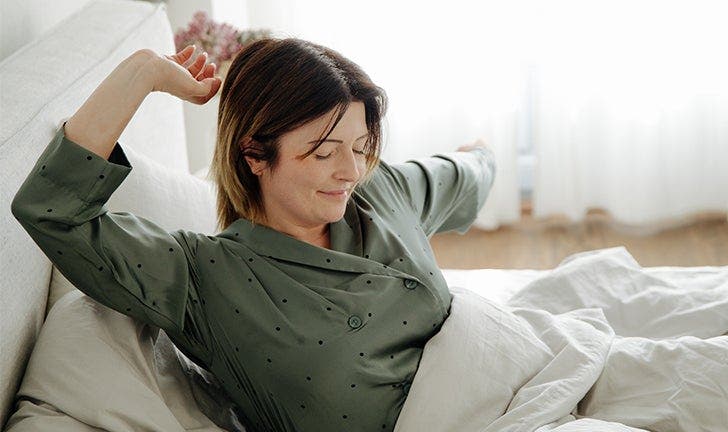Tips For Sleeping Better During The Summer


As the days get longer and warmer, you might find yourself having more trouble sleeping than usual. No need to worry, we have some tips to help you sleep well through the night to get the most out of those summer days.
Staying cool is key
Keeping your bedroom cool at night is arguably the most important factor in achieving a comfortable sleep in the summer. Interestingly our beds actually have a microclimate all their own. This microclimate refers to the temperature of the bed itself and the area directly around it.
Your bed’s microclimate can be impacted by the following factors.
1 . Room temperature
When the air temperature is too warm it negatively affects our REM sleep and can result in more overall sleep disruptions. Most doctors recommend setting the thermostat between 60 to 67 degrees Fahrenheit (15.6 to 19.4 degrees Celsius) for the most comfortable sleep. Now it might be ideal to keep your home at this temperature all the time, but it can be a good strategy to turn down the temperature at night.
If you live in a home without air conditioning there are some other strategies for keeping cool at night. Fans can be a big help in removing warm air from your bedroom and circulating cooler air. Try setting your ceiling fan to run in a counterclockwise direction to suck up hot air. You can also achieve a similar result by positioning smaller fans by an open window. With this method, you can either have the fan facing out to push out warm air from the room or facing in to pull in cooler air from outside.
2. Body temperature
While it can be tricky to actually reduce your body temperature, there are ways to make you at least feel cooler. Try taking a cool shower right before bed or wiping your body down with a cool cloth. Drinking a bit of cold ice water before bed can also help you cool down.
3. Mattress choice
Your choice of mattress can also impact how warm or cool you feel at night. Specifically, memory foam mattresses can be known to trap body heat. If you find your mattress might be keeping you hot in the summer months, consider grabbing a breathable mattress topper made of latex, wool, or cotton. There are also plenty of mattresses on the market that encourage heat dissipation, such as those made from gel memory foam and other specialty foams.
4. Sleepwear choice
Your choice of sleepwear contributes to your bed’s microclimate. Ditch the flannel and long sleeves in the summer months and opt for sleepwear made from cotton and cotton blends. Sweating at night can negatively disrupt your sleep, so keep your clothing light.
5. Bedding material
Similar to sleepwear, choosing the right bedding in the summer can help keep you cool. It’s time to put the flannel sheets and heavy duvets away and bring out light cotton or bamboo layers.
If you are still feeling toasty at night, consider keeping your feet outside of the blankets to help your body reach its ideal temperature. One other trick is to actually place your pillowcase in the freezer before bed for a true icy cold pillow.
Watch your sunlight exposure
The start of the summer solstice brings longer days and often more sunlight exposure. Our body’s circadian rhythm or our “internal clock” is heavily influenced by light exposure. Specifically, light exposure delays our body’s production of melatonin, the hormone that helps us sleep.
Our brains tend to use light and darkness as signals for day and night and the longer we are exposed to light the more our body wants to keep us awake. When it doesn’t get dark until 9 p.m. it can be tough for our bodies to know when it’s time to start preparing for sleep. A similar situation occurs in the mornings as we are exposed to sunlight much earlier.
You might want to consider investing in some blackout curtains or an eye mask if you’d like to sleep in longer in the summer months. In the evening, try closing your curtains earlier than you would normally, to let your home get darker. Drawing your curtains during the day will also help to keep your home cooler.
Keep a steady sleep schedule
It can be challenging to keep a consistent bedtime routine during the summer months. This is especially true if you have children at home who are out of school for the summer. By going to bed and waking up at the same time every day your body can develop and maintain a healthy circadian rhythm. Your summer sleep schedule might be different from other times of the year, but setting and maintaining a regular routine can help in getting good restorative sleep.
While consistency is key with sleep, it’s also important to be realistic and realize late nights happen in the summer, and that’s okay! Just remember that a good night’s sleep will give your body and mind the energy it needs to enjoy all the fun summer has to offer.
